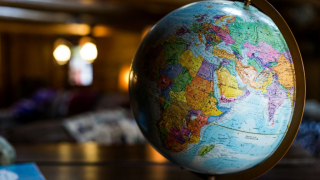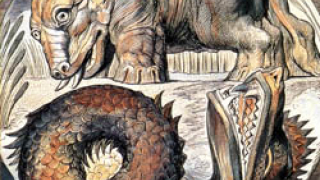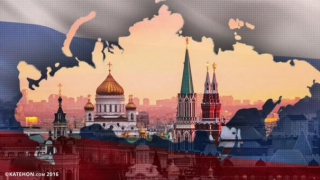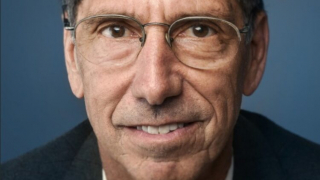Europe’s Magic Skin
The cataclysms currently afflicting EU countries can be described from different perspectives, whether in terms of economics, politics, ideology, international relations, or historical processes. Sometimes, however, literary analogies can help capture the essence of reality while avoiding trite clichés and boring terminologies. Geopoetics is a relatively new phenomenon, but prosaic political cataclysms have often found expression in world classics. There is nothing new under the Moon, as Averroes said, paraphrasing Solomon.
The protagonist of Honoré de Balzac’s novel La Peau de chagrin (The Magic Skin) - the very title of which is a play on words, since in French, chagrin is not only a type of skin, but also means “sorrow” - is a young man who is interested in philosophy, science, and art, but is simultaneously susceptible to all sorts of vices.
This is a perfect illustration of the geopolitical frivolity of both current European rulers and the citizens of most EU countries.
Let us recall the fatal choice of Raphael de Valentin in the very first pages of the novel. He, distinguished by egocentrism and vanity, before entering a store of exotic items, thinks about suicide, but the very thought of how his body would be fished out repulsed him from committing such. “Wretched weather for drowning yourself,” said a ragged old woman, who grinned at him; “isn’t the Seine cold and dirty?’”[1]
Is the same self-centered ego of Europeans one of the reasons for the current crisis? But let us continue. Rafael de Valentina’s choosing the magic skin which grants its owner’s wishes but at the same time shortens his life, was a free choice. Such a subtle relationship between desires and and their embodiment in reality is a typically European tradition, although other regions are often appealed to, such as Goethe’s Faust.
“You have entered into the compact now, and there is an end of it. Henceforward, your wishes will be accurately fulfilled, but at the expense of your life,” the old man told Raphael after he had disclosed his wishes.
In past centuries’ geopolitical games played out on the map of Europe, the desires of rulers have also devoured the lives of people and even states.
Napoleon Bonaparte was apparently the first to dare to create a united Europe, but his endeavors ended in failure after his Russia campaign. The wishes of one man also gave rise to something else, including the Treaty of Paris (with which all of France’s territorial gains before 1792 were annulled), the restoration of the Bourbon dynasty, and the Congress of Vienna which in turn led to the emergence of a new international system, the Holy Alliance, and the concert of powers model.
But the reason for this was the birth of the bourgeois states of the national type, since which: “The Government, that is, the aristocracy of lawyers and bankers who represent the country to-day, just as the priests used to do in the time of the monarchy, has felt the necessity of mystifying the worthy people of France with a few new words and old ideas, like philosophers of every school, and all strong intellects ever since time began.”
This can be applied not only to the last presidential elections in France, but also other European regions. One needs only to shift the emphasis and amend the shift in historical era. If earlier, decisions were made in one quarter of a capital, then now they have moved to another place altogether. And if Milton’s Pandemonium appeared in Balzac’s era in the form of nighttime drinks for the respectable bourgeoisie with invited Bohemians, then now it is an orgy of homosexuals legalized by EU countries and a motley crowd of migrants enthusiastically setting European citizens’ cars ablaze.
It should be noted that, although the novel mentions other countries as well, the text is almost entirely devoted to Paris, which is characteristic of Honoré de Balzac’s other works as well. In the early 19th century, Paris was the “center of the world”, at least as it was perceived as such by the French themselves. Here it is, one of the hotbeds of Eurocentrism which evolved into the West’s epistemological racism.
Of course, then there was Hitler, who tried to paint his own pictures on the magic skin of Europe. The result was more than deplorable.
How can Raphael’s wasted wishes which ate up his life be considered now from the standpoint of geopolitics? Let us look at the bigger picture beyond individual human destinies. The political will of the Eurocommissioners has also wished for a lot - a single currency, a single political space, and a whole mass of projects from multiculturalism to Euro-Atlanticism, pacifying the Balkans, the Eastern Partnership, etc. The result: Brexit, a number of EU members’ refusal to adopt the euro as their currency, the temporary imposition of restrictions on free movement within the Schengen Area, new unrest in the Balkans, the rapid disintegration of Ukraine, and referenda in Spanish Catalonia and Italian Veneto-Lombardy.
What other desires lurk in the minds of the Eurocommissioners and the leaders of European states? Catastrophe is already looming so close, and the size of Europe’s magic skin is already appallingly small…Does Europe have one last chance?
[1] All excerpts fromThe Magic Skin are from the Project Gutenberg online edition: http://www.gutenberg.org/files/1307/1307-h/1307-h.htm
Translated by Jafe Arnold














